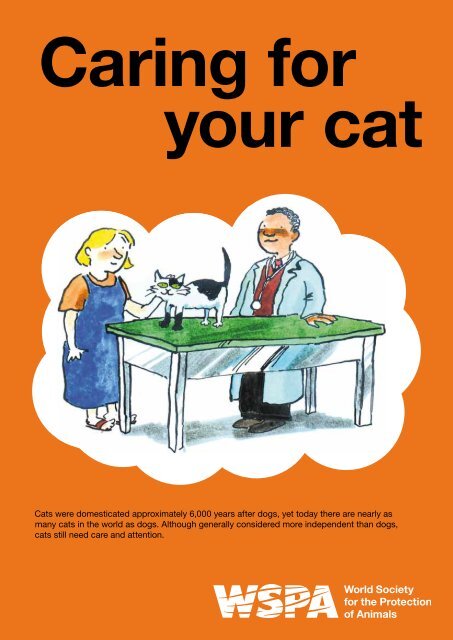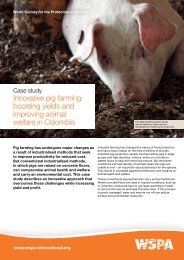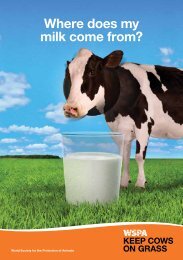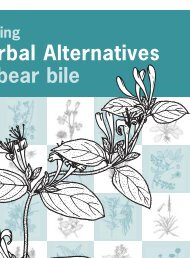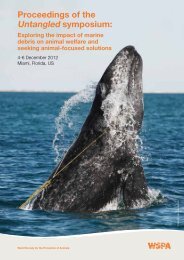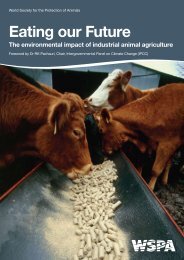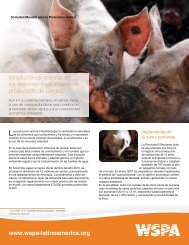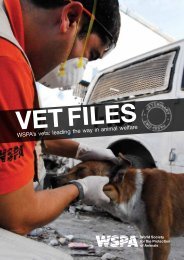Caring for Your Cat - WSPA
Caring for Your Cat - WSPA
Caring for Your Cat - WSPA
Create successful ePaper yourself
Turn your PDF publications into a flip-book with our unique Google optimized e-Paper software.
<strong>Caring</strong> <strong>for</strong><br />
your cat<br />
<strong>Cat</strong>s were domesticated approximately 6,000 years after dogs, yet today there are nearly as<br />
many cats in the world as dogs. Although generally considered more independent than dogs,<br />
cats still need care and attention.
How to care <strong>for</strong> your cat<br />
In order to stay healthy and happy, a cat needs:<br />
• a balanced diet • access to the outdoors • a bed with a blanket<br />
• companionship/to be played with • veterinary care • to be spayed/neutered<br />
• to be looked after if you go away on holiday • to be groomed regularly.<br />
Where your cat lives<br />
• A cat that lives outside needs shelter from hot or cold weather.<br />
• <strong>Your</strong> cat should be able to go in and out of the house<br />
during the day.<br />
Food and water<br />
• A cat needs a balanced diet and will not thrive on scraps.<br />
<strong>Cat</strong>s require a greater proportion of meat than dogs and<br />
need a higher level of protein and fat in their food.<br />
• There are many types of cat food available that provide a well-balanced diet,<br />
including tinned or dried food.<br />
• <strong>Your</strong> cat should be given fresh drinking water at all times, especially<br />
if you choose to feed dried products.<br />
• Feed adult cats twice a day. Kittens, elderly cats and<br />
pregnant cats will need several smaller meals daily.<br />
• <strong>Cat</strong>s do not have to be hungry to hunt – it is something<br />
they do naturally, although toys may help fulfil this need.<br />
Human company<br />
• A cat is less demanding than a dog, <strong>for</strong> example they do not need to be taken <strong>for</strong> walks.<br />
• Giving your cats attention will show them that you care.<br />
• <strong>Cat</strong>s are generally independent animals, and will seek companionship when they want it.<br />
For times when your cat might want to be alone, you should provide a quiet retreat.<br />
Health<br />
• <strong>Cat</strong>s kept in dirty conditions can become infested with<br />
worms, ticks, fleas or lice.<br />
• Sleeping and living areas should be kept clean and dry.<br />
• Healthy cats have glossy coats and clear eyes.<br />
• Ears and noses should be free from discharge,<br />
dirt and infection.<br />
• Teeth should be strong, white and not discoloured.<br />
Infected gums, if left untreated, can cause suffering.<br />
• Ask your vet <strong>for</strong> advice.
Vaccinations<br />
• <strong>Cat</strong>s are vulnerable to many diseases that can be dangerous and<br />
costly to treat.<br />
• Vaccination helps prevent illness and reduces the risk of infection<br />
to other cats.<br />
• <strong>Cat</strong>s need regular de-worming and flea treatments.<br />
Grooming<br />
• All cats, long or short-haired, benefit<br />
from regular grooming, and it provides<br />
an opportunity to check <strong>for</strong> parasites.<br />
• Long-haired cats need special attention to keep their coats<br />
free of tangles.<br />
• Grooming helps to get your cat used to being handled.<br />
Breeding<br />
• Every year hundreds of thousands of cats are destroyed because there are not enough<br />
suitable homes.<br />
• Female cats can produce many kittens every year. In six years a pair of cats and their<br />
offspring can produce 420,000 cats.<br />
• By constantly producing and rearing kittens, the health of a female cat can suffer.<br />
• Pregnant and lactating female cats need extra food.<br />
• Kittens generally suckle from their mothers <strong>for</strong> about three weeks, gradually starting to<br />
eat additional food.<br />
• Female cats are naturally protective of their young<br />
so a quiet place should be provided <strong>for</strong> them.<br />
• Kittens should stay with their mother until<br />
they are at least eight weeks old.<br />
• To prevent unwanted kittens,<br />
have your cat spayed/neutered –<br />
an operation per<strong>for</strong>med by a vet.
Spaying/neutering<br />
• Modern veterinary equipment and drugs make surgery safe<br />
and recovery quick.<br />
• Ask your vet when to have your cat spayed/neutered.<br />
• <strong>Your</strong> cat does not need to have a litter be<strong>for</strong>e she is spayed.<br />
• Early age neutering from eight weeks of age is now accepted<br />
as a positive action.<br />
• Once a female cat has been spayed she will not come into season<br />
again and will not be bothered by male cats.<br />
• Spaying females can reduce the risk of mammary tumours.<br />
• Unneutered male cats have a habit of spraying an unpleasant<br />
smelling scent to mark their territories, which attracts females.<br />
Neutering reduces this behaviour.<br />
• Neutering also reduces rival fighting amongst cats.<br />
• Neutered cats are likely to be more affectionate and their ability to<br />
hunt is not affected.<br />
• In stray and feral cats, ear tipping, or cutting off the tip of the left ear<br />
while the cat is still anaesthetised, is the universal way of identifying<br />
cats that have been spayed/neutered.<br />
Consult your vet<br />
Remember your vet can advise you on:<br />
• the type/breed of cat that would best suit your life style and expectations<br />
• diet • training your cat • treatment against parasites<br />
• vaccination • spaying/neutering • any other health concerns.<br />
The World Society <strong>for</strong> the Protection of Animals (<strong>WSPA</strong>) is the world’s largest alliance of animal<br />
welfare organisations. Through partnership with hundreds of member societies we strive to<br />
create a world where animal welfare matters and animal cruelty ends. We bring about change<br />
at both grass roots and governmental levels, to benefit animals. We support and develop<br />
high-profile campaigns, scientifically-backed projects and innovative education initiatives.<br />
With our member societies, governments and international agencies, we also respond to<br />
animals in communities affected by disasters.<br />
Local Contact<br />
89 Albert Embankment, London SE1 7TP, UK.<br />
Tel: +44 (0)20 7587 5000 Fax: +44 (0)20 7587 5057<br />
E-mail: wspa@wspa-international.org<br />
www.wspa-international.org


